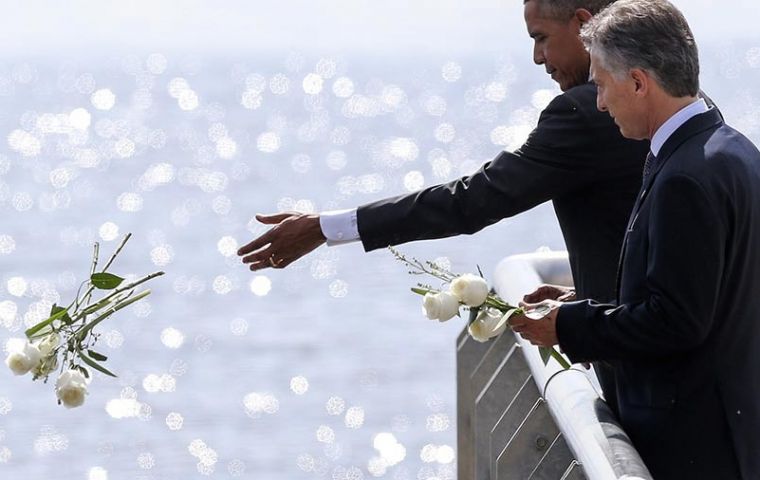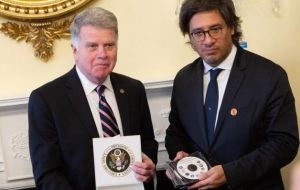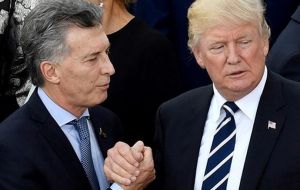MercoPress. South Atlantic News Agency
US hands Argentina thousands of declassified documents from the military dictatorship
 United States fulfilled a pledge made three years ago by then president Barack Obama when he honored the victims of the 1976-1983 military regimes
United States fulfilled a pledge made three years ago by then president Barack Obama when he honored the victims of the 1976-1983 military regimes  Receiving the files from the archivist of the United States, Argentina's Justice Minister German Garavano (R) said the documents “will be fundamental to justice.”
Receiving the files from the archivist of the United States, Argentina's Justice Minister German Garavano (R) said the documents “will be fundamental to justice.”  In a letter to Argentine president Macri, Trump said declassification “demonstrates our shared commitment to promoting open and transparent government.”
In a letter to Argentine president Macri, Trump said declassification “demonstrates our shared commitment to promoting open and transparent government.” The United States handed thousands of documents on Friday to Argentina on disappearances by the military dictatorship (1976/1983), completing Washington's biggest-ever transfer of documents to another government.
With a ceremony at the National Archives, the grand Greco-Roman building in central Washington that is home to the US Constitution and other founding documents, the United States fulfilled a pledge made three years ago by then president Barack Obama when he honored the victims of the 1976-1983 military regime on a visit to Buenos Aires.
Receiving the files from the archivist of the United States, Argentina's Justice Minister German Garavano said the documents “will be fundamental to justice.”
“This is good news for the Argentine people to learn from the past and not repeat this in the future,” he said.
In an accompanying letter to his Argentine counterpart Mauricio Macri, President Donald Trump said the declassification “demonstrates our shared commitment to promoting open and transparent government.”
“It also reflects the importance that the United States places in its relations with Argentina,” said Trump, who visited Buenos Aires in late 2018.
“My hope is that access to these records provides the people of Argentina information to help in the healing process.”
The State Department said that the United States was releasing 6,000 new documents, bringing the total handed over through the project to 50,000 pages.
The files include memoranda and correspondence from the State Department, CIA and other agencies that detail what the United States knew about the abuses in Argentina.
Some 18,000 people were killed or remain missing from Argentina's “dirty war,” when security forces and right-wing paramilitaries hunted down any perceived leftists.
The military ousted president Isabel Peron in 1976, one of a series of coups in Latin America supported by the United States under top diplomat Henry Kissinger as part of the worldwide offensive against communism.
Trump is seeking to oust Venezuela's President Nicolas Maduro. But he did not stop the declassification amid appeals from Macri, a conservative who enjoys warm relations with Trump.
The National Security Archive, the history project at George Washington University that frequently takes legal action to declassify documents, praised the comprehensiveness of the release.
“The Argentina Project represents a new model of declassification diplomacy, and more,” said Carlos Osorio, an analyst at the archive.




Top Comments
Disclaimer & comment rules-

Read all commentsSome of the newly declassified documents show in excruciating detail the extent to which the US knew about the methods used by the Argentine military dictatorships to eliminate suspected opponents.
Apr 14th, 2019 - 06:58 pm -1In addition, some declassified reports created by US intelligence refer in great detail to the Plan Condor by which the dictatorships of Argentina, Uruguay, Chile, Paraguay and “to some extent” Bolivia and Brazil worked together to eliminate opponents in any of those countries.
“Selection of targets: Each representative will put forth his choice of target in the form of a proposal,” reads in English one of the US intelligence reports now declassified. “The final selection of a target will be by vote and on the basis of simple majority.”
These and other documents show in chilly detail the extent to which the US knew about the extent and planning with which human rights abuses were perpetrated in most of Latin America, particularly in countries of the southern South American cone.
At the time, the military described any appearance of murdered civil individuals as “excesses of war,” which they considered normal in an armed conflict. In reality, each kidnapping, each interrogation, each torture case and each summary execution was planned and approved by the military, and as it becomes now official, in full knowledge of the central countries and especially the US.
At the time, however, denunciations of relatives of those kidnapped were ignored, or at the most, the principle of non-intervention in internal affairs of the countries named was invoked.
Such principle, however, was conveniently dropped in cases such as the Grenada island in 1983, Panama in 1989, Venezuela in 2002 and Haiti in 2004. The non-intervention principle appears forgotten now in relation to Venezuela.
Poor Latin America: so far from God -- so close to the US.
Commenting for this story is now closed.
If you have a Facebook account, become a fan and comment on our Facebook Page!